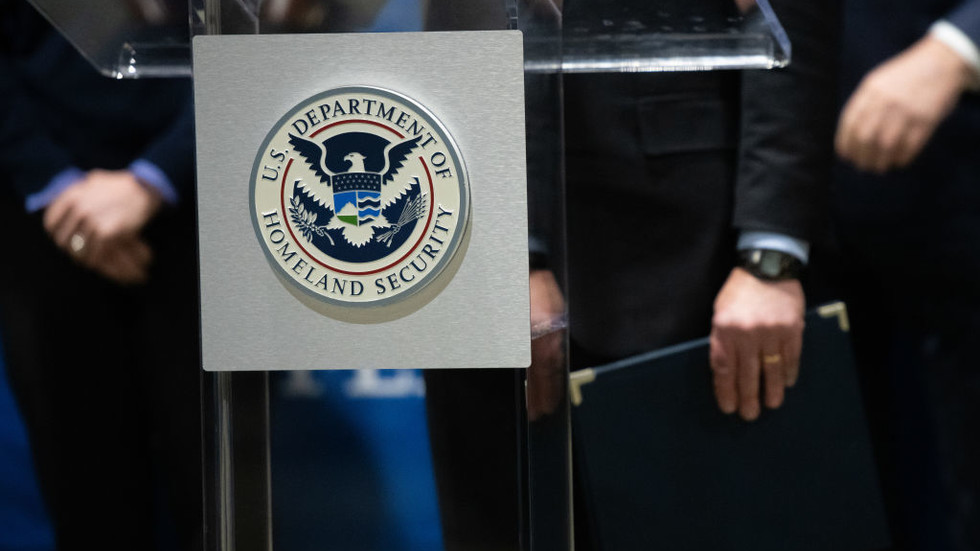
DHS has a little-known domestic surveillance program as well as concerns over political abuse and retaliation

FILE PHOTO. The US Department of Homeland Security seal, March 2, 2021 © Mark Makela/Getty Images
The Department of Homeland Security is operating a “virtually unknown” intelligence-gathering program within the US, Politico reported Monday, citing internal documents. Also among the revelations were concerns by many DHS staff that their work was inappropriate or illegal, and about the influence of politics on operations.
The “Overt Human Intelligence Collection Program” (OHIC) has been in existence since at least 2016, according to Politico, which did not disclose how it obtained the documents.
Run by the DHS Office of Intelligence and Analysis (I&A), OHIC is intended to gather information about threats such as organized crime and transnational drug trafficking. The program allows DHS officials to “seek interviews with just about anyone” in the US, including people held in local jails and federal prisons. Concerns that not having an attorney present for the interviews might violate people’s civil rights reportedly led to that particular “element” of OHIC being “paused” in 2022.
“While this questioning is purportedly voluntary, DHS’s policy ignores the coercive environment these individuals are held in. It fails to ensure that individuals have a lawyer present, and it does nothing to prevent the government from using a person’s words against them in court,” Patrick Toomey of the American Civil Liberties Union (ACLU) told Politico.
Carrie Bachner, a former DHS adviser and congressional liaison, called it “immoral” that the agency might be “interviewing folks that still have constitutional privileges, without their lawyer present.”
Other documents show that some DHS employees had similar misgivings about the legality and morality of the department’s operations. An email from November 2020, just after the US election, summarizes a dozen “listening sessions” with I&A employees. Among their complaints was that many of their tasks were “law enforcement matters and not for an intelligence organization,” and that the rubric of ‘Departmental Support’ seemed like “a loophole that we exploit to conduct questionable activities.”

Read more
The same email quoted one employee who called the Field Operations Division leadership “shady” and said it “runs like a corrupt government.” Those who offered feedback or criticism the leadership did not appreciate, said another, might find themselves getting transferred to the US-Mexico border, or to Portland.
Portland, Oregon was the site of a media scandal involving the DHS in the summer of 2020, when violent ‘Antifa’ demonstrators attacked the federal courthouse. At the end of July, the Washington Post accused the I&A of spying on journalists and protesters. Two days later, I&A head Brian Murphy was ousted. His replacement, Joseph Maher, revoked a previous instruction – interpreting then-President Donald Trump’s order to protect federal buildings as well as monuments from rioters – and said the I&A had determined a “narrower interpretation” was better aligned with its authority.
Maher went on to work for the January 6 Select Committee, stood up by Congressional Democrats to accuse Trump of “insurrection” at the US Capitol.
Acting Deputy Under Secretary for Intelligence Enterprise Operations Stephanie Dobitsch, who authored the instruction Maher revoked, was later hired in a permanent capacity. In a March 2022 email commenting on the Intelligence Community Climate Survey Analysis, Dobitsch noted that the most significant instances of “distortion or suppression” of intelligence analysis reported by the I&A staff had to do with protection of “bureaucratic interests.”
The same survey for the fiscal year 2020 noted that the DHS workforce “has a general mistrust of leadership resulting from orders to conduct activities they perceive to be inappropriate, bureaucratic, or political.”




